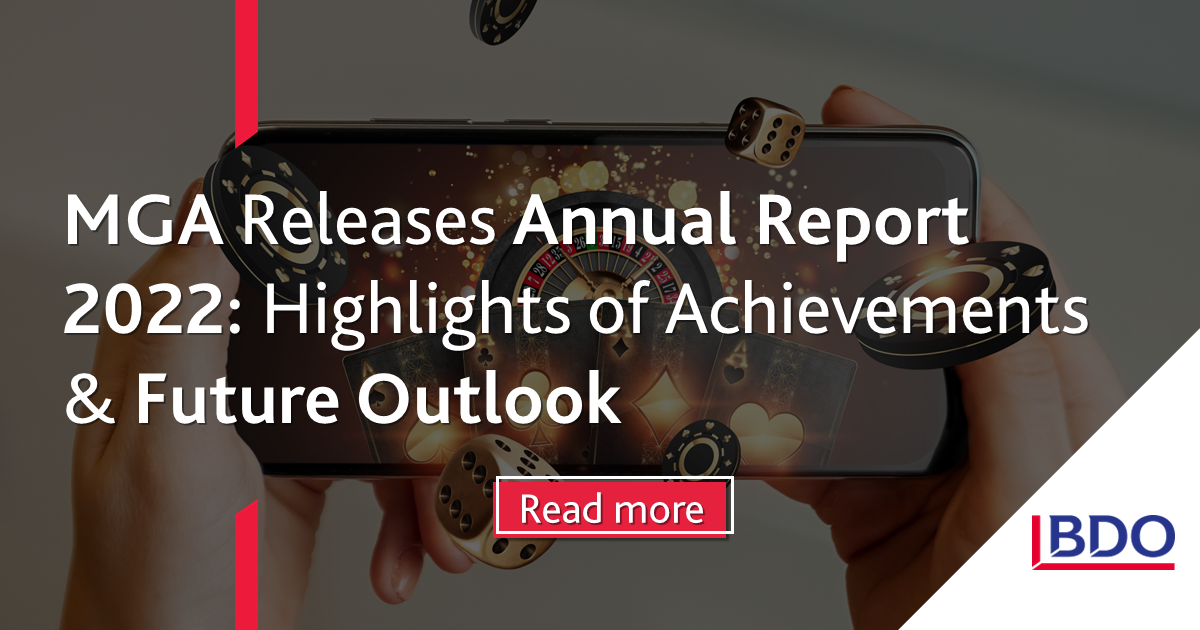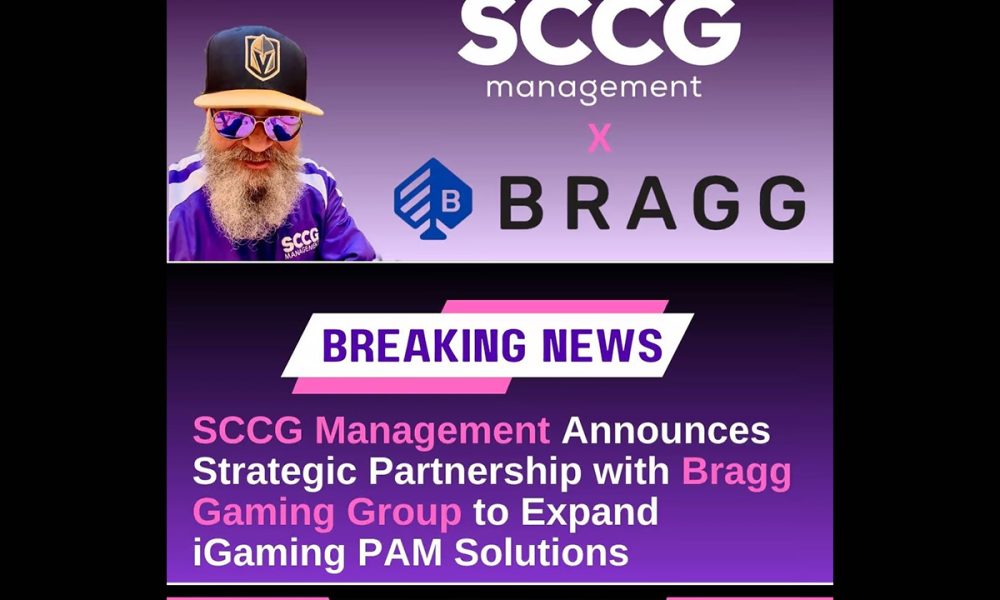

Latest News
The MGA publishes its 2022 Annual Report and Financial Statements
The Malta Gaming Authority (MGA/Authority) is publishing its Annual Report and audited Financial Statements for the financial year ending 31 December 2022. In addition to outlining the performance of the Maltese gaming business in 2022, the report gives a broad summary of the Authority’s accomplishments during the year under review and offers a medium-term outlook for the future. A thorough report outlining key statistics for the land-based and online gaming industries is then presented.
Supervisory Activities
- 28 compliance audits were conducted and 228 desktop reviews were carried out during 2022, accompanied by additional AML/CFT compliance examinations that are carried out by the FIAU, or by the MGA on its behalf. Following information which emerged from compliance audits, compliance reviews and formal investigations, the Authority issued 10 warnings and cancelled six (6) licences. In addition, the MGA issued a total of 16 administrative penalties as well as three (3) regulatory settlements, with a collective total financial penalty of €179,150.
- A total of 25 licensees were subject to remediation and/or administrative measures by the FIAU, ranging from written reprimands to administrative penalties, based on the breaches identified during examinations carried out in previous years, including by the MGA. In total, these amounted to just over €738,000.
- Six (6) individuals and companies were deemed by the Fit & Proper Committee to not be up to the Authority’s probity standards due to various factors, including due to the risks of money laundering or funding of terrorism.
- Forty-one (41) gaming licence applications were received during 2022. Thirty-one (31) licences were issued, while twenty-one (21) were unsuccessful.
- Over 1,500 criminal probity screening checks were undertaken on individuals, shareholders and ultimate beneficial owners, key persons and other employees, and companies from both the land-based and online gaming sectors.
- The Authority conducted 48 interviews with prospective MLROs and key persons carrying out the AML/CFT function to determine the knowledge and suitability of each candidate.
- The Commercial Communication Committee of the MGA issued a total of nine (9) Letters of Breach following breaches of the Commercial Communications Regulations (S.L. 583.09).
- In its efforts to protect players and encourage responsible gambling, the Authority supported a total of 5,280 players who requested assistance, covering most of the cases received during 2022 and the spill-over from 2021.
- The MGA conducted 85 responsible gaming-themed website checks, through which 38 URLs were found to have misleading information. This led to 17 notices being published on the MGA website, and 30 observation letters that were sent out reflecting responsible gaming issues.
Improvements in Efficiency and Effectiveness
- The Authority commissioned a sectorial skills strategy to address the gaming industry’s challenges with respect to the ongoing demand for qualified and skilled human capital, which increased significantly as the economy grew and diversified into numerous sectors.
- Consultation exercises were conducted with industry stakeholders regarding the bets offered by licensees – with a focus on sports integrity and player protection considerations – on the proposed amendments to the Player Protection Directive (Directive 2 of 2018), and on the proposed policy on the use of Innovative Technology Arrangements (ITAs) and the acceptance of Virtual Financial Assets (VFAs) and Virtual Tokens, which led to amendments and a finalised Policy, respectively.
- The Authority streamlined the approval process of appointing an MLRO in collaboration with the FIAU while, at the same time, ensuring that the industry is kept updated on any changes affecting this process and on any best practices that are intrinsic to the role of the MLRO.
- The concept of Agreed-Upon Procedures (AUPs) Reports was introduced, covering player funds and Gaming Revenue. Audit firms are drawing up these reports in compliance with the ‘International Standard on Related Services (ISRS) 4400 (Revised) Agreed-Upon Procedures Engagements’.
- The MGA kickstarted a process for possibly implementing a voluntary Environmental, Social and Governance (ESG) Code of Good Practice for the industry to showcase and increase the positive social and environmental impacts of the gambling sector.
National and International Cooperation
- Throughout 2022, the Authority issued 43 news items on its website and 26 external communications, providing a synopsis of various updates and developments at the Authority and across the industry.
- A total of 224 alerts were sent to the industry, 167 of which were also sent to the appropriate Sports Governing Bodies.
- A total of 44 requests for information specifically relating to the manipulation of sports competitions or breaches in sports rules were submitted by enforcement agencies, sport governing bodies, integrity units, and other regulatory bodies. As a result of such requests, data was exchanged in 25 instances. Additionally, a total of 475 suspicious betting reports from licensees and other concerned parties were received.
- During the period under review, the Authority was a direct participant in 15 different investigations across the globe relating to the manipulation of sports competitions or breaches in sports rules, as well as an indirect participant in 3 such investigations.
- The Authority received a total of 83 international cooperation requests from other regulators and sent 97 such requests, with the majority referring to requests for background checks as part of an authorisation process.
- A total of 177 official replies were issued providing feedback on the regulatory good standing of our licensed operators to the relevant authorities asking for this information.
- The MGA works together with other local regulating authorities and governing bodies. This is reflected through responses furnished by the MGA to requests for information made by the Asset Recovery Bureau (ARB), the FIAU, as well as the MPF on the gaming sector. Additionally, the relevant information is provided to the Sanctions Monitoring Board (SMB) to assist in issuing penalties in instances of non-compliance with sanctions screening obligations.
In publishing this report, the CEO, Dr Carl Brincat said: “This report is testament to our collective efforts in promoting a fair and sustainable gaming ecosystem. Through proactive measures and leaner regulation processes, we strive to ensure a level playing field that nurtures innovation while safeguarding against any potential risks.
“As the global gaming landscape evolves, our role becomes even more critical. We embrace this responsibility with utmost determination, working tirelessly to stay ahead of emerging trends, technologies, and challenges. We remain steadfast in our pursuit of robust frameworks that inspire confidence, protect vulnerable individuals and render Malta the home for gaming operators of good will.”
Latest News
🚀 Stellar Soft: From Africa’s Betting Shops to the Future of Global iGaming

The iGaming industry is one of the fastest-changing landscapes in the world. New technologies, shifting regulations, and evolving player expectations create both challenges and enormous opportunities. In this environment, only those who dare to innovate, adapt, and partner wisely are able to thrive.
One company that embodies this journey is Stellar Bets — an ambitious software provider that began in Africa and is now preparing to reshape the future of retail betting in Europe. Our story is not just about creating games. It’s about building a complete ecosystem for operators, affiliates, and entrepreneurs — and opening doors for long-term partnerships across continents.

When we entered the African market, the industry was already crowded with solutions. Many thought there was little room left for innovation. But we believed otherwise.
From the start, we knew the secret to success wasn’t just about building games — it was about designing ecosystems. Operators needed more than entertainment; they needed reliable tools, sustainable margins, and technology that would support them in real conditions — including low internet speeds, limited hardware, and highly competitive retail environments.
Our first big step was the launch of Stellar Rocket, a crash game that quickly captured the imagination of African players. With stunning visuals, a dynamic multiplier, and an innovative balance between player wins and operator profitability, it became much more than just a game — it became a movement.
Within months, betting shops from Nigeria to Kenya were reporting higher engagement, stronger retention, and more stable revenue. The success of Stellar Rocket proved that innovation could transform even the most traditional retail setups.

Success stories are powerful, but in iGaming the numbers matter most.
- In 2024–2025, Stellar Bets expanded into more than 15 African countries.
- Successfully achieved the ideal balance between player satisfaction and operator profitability with our Next-Gen RTP System.
- Operators reported 30–45% revenue growth after integrating our solutions.
This growth wasn’t accidental. It came from a deep commitment to R&D, continuous improvement, and a philosophy that sees technology as a service to both operators and players.
And here’s the key: we didn’t just help operators earn more — we also made sure players enjoyed fairer, more exciting experiences. In a market where achieving both can be challenging, this balance clearly sets Stellar Bets apart.

The heart of Stellar Bets has always been innovation, but we quickly realized that individual games are not enough. Operators need comprehensive solutions to scale their business.
That’s why we built an ecosystem:
- Stellar Box — a plug-and-play solution that allows operators to deploy instantly.
- Stellar Kiosk — an all-in-one machine with built-in computer and receipt printer.
- Cloud-based admin tools — for user management, analytics, and cashier control.
- Proprietary hardware — designed for stable operation even in areas with low bandwidth.
- AI-powered RTP engine — balancing fairness for players and profits for operators.
And perhaps the most groundbreaking innovation of all — HomePlay.

Retail betting shops are still the heartbeat of many markets. But until recently, their biggest limitation was the number of physical terminals. Only so many customers could play at the same time.
With HomePlay, we changed that forever.
This breakthrough technology transforms every smartphone inside a betting shop into a personal gaming station. Customers join live Stellar Rocket sessions using their own devices, while the cashier desk continues to handle all deposits and withdrawals.




In essence, HomePlay gave new life to retail betting, transforming it from a simple place to play into a vibrant community where thousands of players share emotions and experiences — while providing operators with a scalable, compliant, and seamlessly integrated tool.
For many partners, this feature alone was a game-changer — and it’s one of the clearest examples of how Stellar Bets delivers innovation designed for real-world business impact.

One question we often get is: how can a startup compete with legacy companies in the iGaming space?
The answer is simple — being a startup is our biggest advantage.





But above all, we recognize the importance of technological excellence — investing in R&D, proprietary hardware, and resilient software that deliver security, stability, and reliability for both operators and players. It’s this mindset that has powered Stellar Bets from a small startup into one of the most recognized software providers in Africa.

After building a strong foundation across Africa, we are now preparing for the next chapter — entering the European market. We see great potential in several EU countries where many operators still depend on outdated systems and solutions.
Our goal is not just to expand, but to bring real value: technology that has proven itself in highly competitive retail environments, tools that balance innovation with compliance, and products that boost both player satisfaction and operator revenue.
For us, Europe is an opportunity to share what we’ve learned, adapt to new contexts, and grow together with forward-looking partners who are ready for benefit from:



We know our success depends on the success of our partners. That’s why we treat every collaboration as a joint venture — where both sides grow together.
And here’s our invitation: if you are looking for an iGaming software partner who delivers not just games, but full-scale solutions designed for growth — Stellar Bets is ready to work with you. Let’s reshape the future of iGaming — together.



The post 
blackjack
N3on Joins Iggy Azalea as Partner and Co-Owner of MOTHERLAND Casino

Globally recognized streaming star N3on has officially partnered with Grammy-nominated artist and entrepreneur Iggy Azalea as co-owner of MOTHERLAND, the online casino and gaming platform pushing the boundaries of entertainment, gaming, and crypto culture.
Since launching, MOTHERLAND has distinguished itself as the sexiest and most entertainment-rich casino on the Internet, blending gambling, livestreaming, celebrity appearances, and community into a one-of-a-kind destination. N3on’s entry as a co-owner and partner signals a bold step forward in expanding the platform’s reach into the global gaming and streaming community.
MOTHERLAND, developed in collaboration with Kasino Labs and backed by crypto powerhouse Karatage, has become a leader in the new wave of digital entertainment. Players can enjoy slots, blackjack, poker, roulette, live dealer games featuring Playboy bunnies (official partners), influencer livestreams, sports betting, and an ever-growing pipeline of unique games and experiences.
With a massive global following built through streaming and content creation, N3on brings cultural relevance and direct engagement with the next generation of gamers, strengthening MOTHERLAND’s position as the ultimate fusion of crypto, casino, and entertainment.
“Joining Iggy as a co-owner of MOTHERLAND is more than just a business move, it’s about shaping the future of gaming culture. I’ve always believed the worlds of streaming, crypto, and entertainment were destined to collide, and MOTHERLAND is proof of that. Together, we’re building a casino that’s not only fun, but one that actually reflects the community and energy of the culture we live in,” said N3on, Partner and Co-Owner of MOTHERLAND.
Iggy Azalea added: “N3on’s partnership marks an incredible next chapter for MOTHERLAND. His influence and connection to the gaming community perfectly complement the bold, entertainment-first vision that has fueled this brand since day one.”
The post N3on Joins Iggy Azalea as Partner and Co-Owner of MOTHERLAND Casino appeared first on Gaming and Gambling Industry in the Americas.
Bragg Gaming Group
SCCG Announces Strategic Partnership with Bragg Gaming Group

SCCG Management, a leading advisory firm in the global gaming industry, has announced a strategic partnership with Bragg Gaming Group, a worldwide leader in iGaming technology and content solutions.
Through this partnership, SCCG will leverage its extensive global network to introduce operators to Bragg’s award-winning Player Account Management (PAM) platform. Bragg’s PAM delivers a fully managed, end-to-end solution that empowers online casino, sportsbook, and lottery operators with seamless integration, robust compliance support, automated KYC and fraud prevention tools, personalized CRM campaigns, and data-driven player engagement features.
With Bragg’s PAM, operators can manage their entire product suite across casino, sports, and lottery verticals through a single account and single wallet—driving stronger retention, higher lifetime value, and scalable growth across regulated markets.
SCCG is uniquely positioned to support the distribution of Bragg’s technology through its global client partner ecosystem, which spans over 130 partners worldwide. With deep relationships across operators, suppliers, and regulators, SCCG will ensure Bragg’s solutions are presented to the right partners in the right markets, accelerating adoption and maximizing impact.
In addition, SCCG will leverage its decades of experience in tribal gaming, where the company has built trusted relationships with tribal operators across North America. Through its Tribal Roadshow and ongoing collaborations, SCCG has consistently introduced innovative technologies that enhance tribal operations. By aligning Bragg’s leading PAM with these relationships, SCCG will provide tribal operators with advanced tools to streamline operations, strengthen compliance, and expand player engagement across both retail and online environments.
Stephen Crystal, Founder and CEO of SCCG Management, commented: “We are thrilled to partner with Bragg, whose PAM platform represents one of the most advanced and trusted solutions in the iGaming industry. At SCCG, we pride ourselves on connecting operators with technologies that drive sustainable growth and compliance across global markets. Bragg’s innovative platform and proven track record make them an ideal partner for operators seeking both efficiency and differentiation in highly competitive environments.”
Matevz Mazij, CEO, Bragg Gaming Group, said: “We’re thrilled to partner with SCCG Management, a respected leader in the global gaming industry. This strategic partnership is a pivotal step for Bragg Gaming Group, aligning two companies dedicated to shaping the future of online gaming.
“SCCG’s unparalleled global network provides the perfect channel to introduce operators to our award-winning Player Account Management (PAM) platform and expand our footprint with operators worldwide.
“This collaboration will enable us to deliver our scalable, responsible, and player-focused solutions to more partners, accelerating the distribution of our technology and strengthening our position as a global leader in iGaming technology.”
The post SCCG Announces Strategic Partnership with Bragg Gaming Group appeared first on Gaming and Gambling Industry in the Americas.
-

 gaming3 years ago
gaming3 years agoODIN by 4Players: Immersive, state-of-the-art in-game audio launches into the next generation of gaming
-
EEG iGaming Directory9 years ago
iSoftBet continues to grow with new release Forest Mania
-
News8 years ago
Softbroke collaborates with Asia Live Tech for the expansion of the service line in the igaming market
-
News7 years ago
Super Bowl LIII: NFL Fans Can Bet on the #1 Sportsbook Review Site Betting-Super-Bowl.com, Providing Free Unbiased and Trusted News, Picks and Predictions
-
iGaming Industry8 years ago
Rick Meitzler appointed to the Indian Gaming Magazine Advisory Board for 2018
-
News7 years ago
REVEALED: Top eSports players set to earn $3.2 million in 2019
-
iGaming Industry8 years ago
French Senator raises Loot Boxes to France’s Gambling Regulator
-
News7 years ago
Exclusive Interview with Miklos Handa (Founder of the email marketing solutions, “MailMike.net”), speaker at Vienna International Gaming Expo 2018








